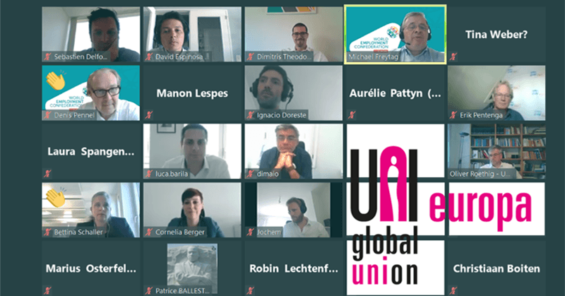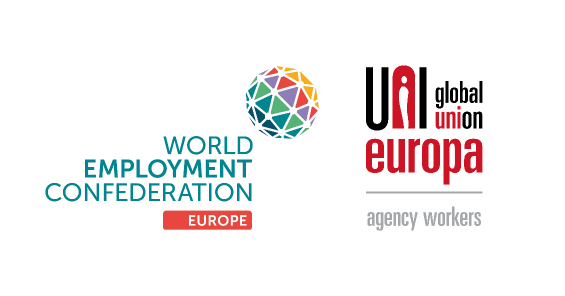UNI Europa and World Employment Confederation (WEC) Europe hosted a webinar on 23 June 2020 to present the Joint Recommendations adopted by the representative Social Dialogue Committee during the COVID-19 pandemic.
Through the joint recommendations, the social partners call upon both the temporary work agencies and the user undertakings to provide adequate health and safety protection. The recommendations call for agencies and undertaking companies to strictly adhere to governmental health and safety measures, support the safe relocation of workers towards sectors in urgent need of workers during the pandemic and to ensure that temporary agency workers who are temporarily laid off maintain their income to the extent possible. When this is not possible, regardless of contract form, the recommendations call to ensure access to social protection for all workers.
Sectoral social partners emphasised the importance of a constructive sectoral social dialogue and that temporary agency work contributes to improve the functioning of labour markets and fulfils specific needs for both companies and workers. The contribution of temporary work agencies to keeping the labour market fluent and functioning is essential during the COVID-19 pandemic and in the phase of the economic recovery.
Social partners called all relevant actors to work jointly on containing the pandemic and protecting the temporary agency workers whilst respecting their terms of employment. Social partners at European level value social dialogue as a powerful framework for finding solutions to safeguard the industry and support the workers.
More importantly, the joint recommendations adopted with WEC Europe call for engaging in social dialogue and collective bargaining at national level. It is at national level, through effective collective bargaining that the social partners can drive economic and social resilience forward.
At EU level, social dialogue has provided the framework for the discussion and adoption of guidelines and recommendations. The reality in our industry at national level is difficult as many critical user undertakings do not renew their contracts with the agencies. It is in this difficult context with an urgent need to re-launch the economy that collective bargaining and social dialogue are more important than ever.
It is only through cooperative social dialogue and effective collective bargaining that we will be able to counteract the employment contraction we face and to ensure a safe resumption of work. The European social partners have opened the way and now we need to implement these recommendations at national and company levels respectively.
“The industry needs to contribute to the recovery but in order to build that resilience, a national level playing field must be found through collective bargaining so as to avoid a race-to-the-bottom in terms of working conditions,” said Dimitris Theodorakis – Director PAW
During the webinar, Sigried Caspar, from the DG Employment & Social Affairs, welcomed the initiative taken by the social partners at European level and in the Member States to undertake a constructive dialogue that produces recommendations and guidelines such as the ones achieved in the sector. She related our Joint Recommendations to the efforts undertaken at EU level by other sectoral social dialogue committees and stressed the importance of social dialogue in these times. She posited that the Joint Recommendations are fully in line with the more general efforts and initiatives of the European Commission in view of the recovery. Tina Weber from Eurofound highlighted that the Joint Recommendations touch upon several of the issues that Eurofound has been researching such as telework, relocation of workers from low to high demand sectors and skills and training. She welcomed the initiative taken in the industry and presented the Eurofound latest findings in terms of living and working conditions.
Social partners from Italy, France and the Netherlands took the floor to present these 3 national cases and how national level social dialogue and collective bargaining provided tangible results during the pandemic to safeguard the working conditions and the employment terms of workers. In the Netherlands the bipartite (temporary work agencies and unions) Foundation Doorzaam made vouchers of €500 available to be used in training by those who lost their job because of the COVID-19 crisis. In Italy also a bilateral solidarity fund took the initiative to provide an allowance for the employees affected by the pandemic. The social partners in France highlighted their work together to issue national joint declarations to protect the health and safety of temporary agency workers.
WEC and UNI Europa are continue to strengthen social dialogue at European level and to keep up good cooperation in the Temporary Agency Work sector to build resilience for the future and prepare for the recovery and the transitions ahead. UNI Europa encourages social partners at national level to engage in collective bargaining to derive tangible protections for workers and gear up for the transitions ahead.


